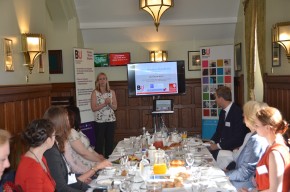Imagine not being able to recognise your own child at nursery or even pick out your own face from a line-up of photos.
This is just how severe face blindness, or prosopagnosia, can be.
“In extreme cases, people might withdraw socially – become depressed, leave their job, or just suffer endless embarrassment,” said Bournemouth University psychologist Dr Sarah Bate.
Dr Bate leads the Centre for Face Processing Disorders at BU, which carries out research to advance understanding of the causes of prosopagnosia and develops training strategies that can help to improve face recognition skills.
The Centre is now campaigning for formal recognition of face blindness, and has launched an e-petition for the issue to be discussed in parliament.
“Children with prosopagnosia can find it really difficult to make friends because all children wear school uniforms in the UK – this takes away any external cues to recognition,” said Dr Bate.
“If children with face blindness seem socially withdrawn, this is often misinterpreted as an indicator of other socio-emotional difficulties or behavioural problems because of the lack of professional awareness of prosopagnosia.”
She added: “Because prosopagnosia is not a formally recognised disorder, many people are reluctant to inform their employer that they have the condition, despite it influencing their performance at work or their relations with colleagues and clients.
“Indeed, many people feel they would be discriminated against if managers became aware of their condition, and this may prevent promotion and impede other opportunities in the workplace.”
Until the last decade or so, face blindness was virtually unknown, with just a handful of documented cases.
But now thousands of people have contacted Bournemouth University, the largest research centre in the UK investigating the condition.
Dr Bate estimates one in 50 people suffer from prosopagnosia to some degree – some struggle to put a name to a face while others can’t recognise people they have known their whole lives.
Those with severe forms of the condition typically cannot recognise spouses, children or other family members and some cannot even recognise their own reflections in the mirror.
Dr Bate said: “I imagine there is such low awareness of prosopagnosia because it has traditionally been thought of as a rare disorder, and only recently has it become clear that it affects many people.
“Someone said to me recently that public awareness about prosopagnosia is where Attention Deficit Hyperactivity Disorder (ADHD) was 20 years ago, and there’s a real upwards battle to achieve sufficient recognition amongst the public and professionals.”
The disorder can be acquired following neurological trauma or illness, such as a head injury or stroke, but many more people suffer from a developmental form of the condition and have lifelong difficulties in face recognition.
There may be as many as 1.5 million prosopagnosics in the UK alone, but public and professional awareness of the condition is low.
Dr Bate hopes that the Centre’s public awareness campaign will lead to greater recognition of prosopagnosia.
The campaign includes an e-petition, which needs 100,000 signatures to have the condition discussed in parliament.
“It’s going to take a while to achieve the required number of signatures, but it will get people talking about prosopagnosia and discussing the importance of proper recognition,” she said.
“If the issue does get discussed by government, it’s possible that we can use our research to advise about the need for professional awareness of the condition, and work with appropriate committees to provide information that can be distributed via the NHS and educational and occupational pathways.”
You can sign the e-petition here
To find out more about face blindness and the work of the Centre for Face Processing Disorders visit www.prosopagnosiaresearch.org.
 Bournemouth University
Bournemouth University